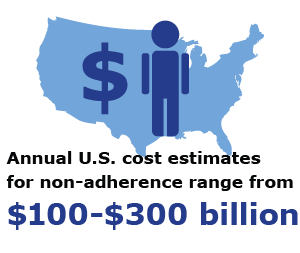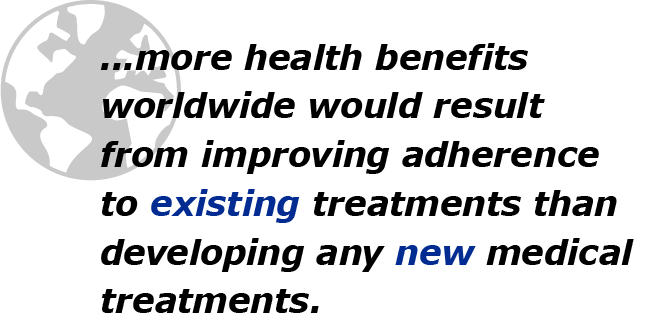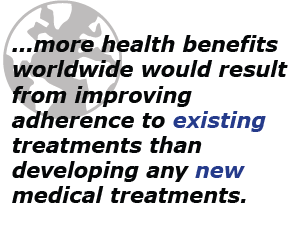As it becomes more urgent to control healthcare costs by improving treatment outcomes of the aging population, there is great opportunity for the ever-growing number of mobile communication users who also are medication users- to play a bigger role in improving their health and the quality of their lives. Improved outcomes also will yield great benefits to society.
Did you know?
New Directions Technology Consulting's managing director is the sole inventor of the mMed patent portfolio of five granted U.S. patents relating to technology that when deployed takes medication telemanagement to patients wherever they are at any time.
Interested in learning more?
Schedule a call or receive more information
The "Other" Drug Problems
Achieving or maintaining health and controlling related costs are often dependent on adherence to medication regimens and protocols, for which patients or their caregivers, not healthcare professionals, are responsible. Medication telemanagement can obviously help patients comply with instructions and improve their outcomes.
Maintaining control of prescription drugs throughout the entire supply chain can assist in ensuring compliance and adequate training, and help curtail abuse, diversion, and improper storage and disposal. View a full list of benefits.
The cost of non-adherence




"Medication Adherence: Making the Case for Increased Awareness," co-authored by Hayden B. Bosworth, Ph.D., Duke University Medical Center, and the National Consumers League
More about the cost of non-adherence
Recent advances in pharmaceutical treatments for many chronic and acute health problems are well known. Left untreated or undertreated, these conditions often lead to decreased quality of life,increased risk of death and higher costs. The effectiveness of medications and their long-term benefits depend on patients' following instructions that they are given for prescribed treatment.
Medication non-adherence is an enormous burden to the world's healthcare system. Annual U.S. cost estimates for non-adherence range up to $300 billion. This includes costs for related additional doctor visits, emergency-room treatments, hospital admissions and additional medicines. A World Health Organization report states that because the magnitude of medication non-adherence is so alarming, more health benefits worldwide would result from improving adherence to existing treatments than developing any new medical treatments.
(From "Medication Adherence: Making the Case for Increased Awareness," co-authored by Hayden B. Bosworth, Ph.D., Duke University Medical Center, and the National Consumers League) Link to www.nclnet.org
Many of the advances are specialty drugs, including biotech products that are administered by the patients. These products are often very costly and require special handling and control through the supply chain, including in patients' hands, to avoid waste from mishandling.